Review: STAR WARS: THE FORCE AWAKENS, A Blast Of Fun
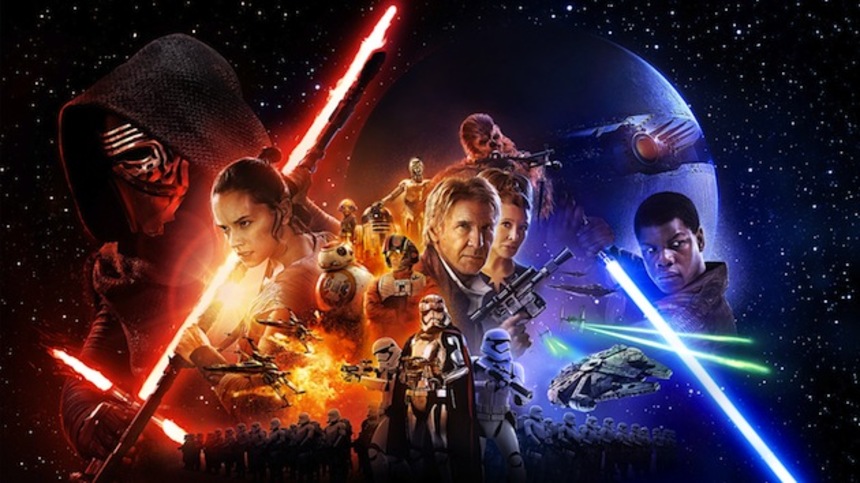
A few hours ago I saw a new Star Wars film.
This wasn't ever something I had planned for. We always knew, back in '80, that there were three untold episodes. The connective tissue was there to tell Annikin's story (and, yes, I prefer the original spelling of Mr. Starkiller), and while it was a rush that it was coming to pass in the late '90s after laying dormant it wasn't a shock.
I too had heard tales of the Journal of the Whills taking up nine (or twelve) episodes, but attributed them to Lucas' usual meanderings and deceits during interviews. When Phantom Menace led the way to a very different sequel, it slowly became less and less appropriate to embrace these forays into the universe. The prevailing sentiment, fostered collectively, became simple - the prequels suck, and as they went on, with hoary tropes of romance and adventure tacked on to trade negotiations and taxation disputes, and many genuinely lost interest in this aspect of the tale.
Whatever your view of the prequels (or even the special edition Reduxes), what's clear is that they're Lucas' vision. What's equally clear is that his own take on his creation doesn't always jive with the most palpable thing about his works - audience expectation. Vincent Canby wrote this about Episode V back in the New York Times:
"The Empire Strikes Back is not a truly terrible movie. It's a nice movie. It's not, by any means, as nice as Star Wars. It's not as fresh and funny and surprising and witty, but it is nice and inoffensive and, in a way that no one associated with it need be ashamed of, it's also silly."
Return of the Jedi of course was even less surprising and more silly; it used almost exactly the same core plot only magnified up to a larger space station, and transferred Wookiees to Ewoks, shifting short to tall, in another typically reductive move. Its echoes of course are deliberate - there's a rhyming scheme to Lucas' poetry, presenting a saga that draws inspiration both from ouroborosian tautology and from more universal mythmaking. It wouldn't be an article on Star Wars if we didn't reference Campbell, so we might as well do so now.
The prequels gave Lucas some narrative freedom and gave certain audience members palpitations. "Childhood rape" was a familiar screed, as if dreams were dashed and we got exactly what we didn't want from this awkward foray into the history behind the history. Midichlorians were mocked, Gungans gagged upon, and "Wizard" definitely didn't catch on the way "scruffy looking nerf herder" did.
Which brings us to today, where a new Star Wars film has been made, one now seen by a select few at various premieres and press screenings. Anticipation is fully piqued, with some exquisitely crafted trailers doing what they needed to do to stoke audience interest. The work of J.J., Kennedy and Disney has been pitch perfect, keeping back key plot lines while stoking the fires of interest. People who long ago gave up any care of this series are interesting in joining in. Star Wars is now firmly part of 2015's zeitgeist.
Which brings me back to something I noted when the first trailer hit and I saw this image:
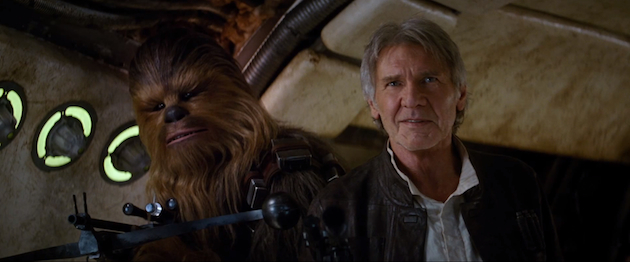
That's Han and Chewie, of course (we're close, so I can use the diminutive for the big man). And this is them from 1977:
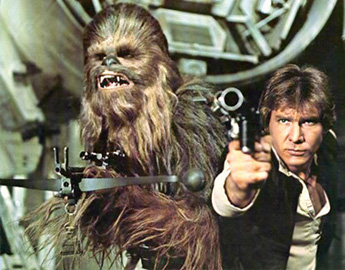
Note that the latter isn't in the film, it's a publicity still. It appeared on puzzles, shirts, games, lunchboxes and so on. It was one of the definitive ways we remembered the film back then, before VHS tapes were ground to dust on repeated viewings, before we had a way to have the films at home. We had action figures to fuel imagination and shots like the one above that served to remind us of what we'd seen.
And somehow, over the years, the ancillary images took the place of the films themselves. Star Wars was more a feeling than a film, a certain visceral thrill mixed with wonder and awe and culminated in a experience like few others in a cinema. Roger Ebert described seeing Star Wars in 1977 as "an out-of-the-body experience... where for a brief moment my imagination has forgotten it is actually present in a movie theater and thinks it's up there on the screen." For Ebert this resulted in "the events in the movie seeming real", and as if he was "a part of them."
The Empire Strikes Back felt like a Star Wars film, even if it was darker and more somber. It upped the ante on the metaphysics, and pulled off one of the greatest magical tricks in cinema history by making us believe a hand puppet was a 900 year old Jedi Master. Jedi felt like a Star Wars film too, but also felt tired, as evidenced by actors dialing in performances that once felt fresh. We can forgive a Ford that clearly wished he'd died back on Cloud City, or mock an intoxicated Fisher trying to vainly convince us that she always knew that the guy snogged back in that sick bay was her brother.
But speeder bikes and Jabba, Sarlaacs and saber fights, those tied directly into our expectations of the film. It all tied up the trilogy in a ribbon, and despite its obvious stumbles gave us more of what we wanted, a bigger, brasher version of the film a few episodes back.
Dive down to the heart of the prequels and if for some they were a stretch to call Star Wars-y they certainly were working within Lucas' ethos. Look to Dex's diner or the detective plot of Clones for a dash of Dashiell Hammet, or Sith's epic final battle that attempts through a sword fight to tease out a duel of Shakespearian proportions. Yes, there were echoes to the other films, but for the most part the saga was still very much looking outwards, referencing Lucas' own childhood, drawing upon the serials and comic books that fueled his own imagination and recontextualizing them into a new framework.
Which brings us, at last, to the Force Awakens, the first film in the series that is about the other movies and our collective reaction to them. It's a movie made by a director raised not on the aspects of Lucas' childhood but on the saga itself. This first post-Lucas Star Wars movie is, in a post-modern way, a direct reflection upon what has come before. It's the first film in the saga made by a fan, for fans, with more regard for pleasing an audience than probing for new ways of storytelling. If Jedi was lazy it was still in its own way ambitious. If the prequels were egregious they still smacked of a storyteller wishing to connect the dots. With Force Awakens, we get instead a very competent, if not very surprising bridge between what's come before and where it's heading.
J.J.'s film feels throughout like a bridge, spanning our memories of what came before to the new tale that its attempting to craft. Numerous elements, from TIE fighters to troopers to the Millennium Falcon, remind what thrilled many decades ago. In that shot above Han walks onto his beloved ship, turns to his furry companion, and tells him (and the audience) that we're home again.
Of course, as per the adage, you can never go home again. You simply can't, under any circumstance, replicate what Star Wars did. You can't have that out-of-body experience that Ebert had given all that has come before. But what you can do is be entertained, to have a raucous and enjoyable time in the cinema without treating this trifle as something more than a mere entertainment. You can drop the pretense and have a good time blasting bad guys, slashing swords and shooting at ships.
Still, you might be missing something that was truly special in what Lucas brought to these films.
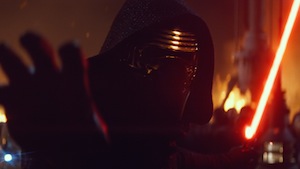 To twist words famously sung by Mick Jagger, sometimes you don't get what you need, you get what you want. The Force Awakens, from its
opening crawl through the final notes, feels like a film that's trying to give people what they want. It feels at times like a greatest hits package,
name-checking elements from the past, bringing elements out of retirement and dusting them off afresh. What makes the process effective is that the
filmmakers know full well that this is what they're doing, even calling attention to it throughout (note the line about C-3P0's red arm for one of the most
overt moments).
To twist words famously sung by Mick Jagger, sometimes you don't get what you need, you get what you want. The Force Awakens, from its
opening crawl through the final notes, feels like a film that's trying to give people what they want. It feels at times like a greatest hits package,
name-checking elements from the past, bringing elements out of retirement and dusting them off afresh. What makes the process effective is that the
filmmakers know full well that this is what they're doing, even calling attention to it throughout (note the line about C-3P0's red arm for one of the most
overt moments).
We have that theme, that glorious theme playing as the logo recedes and a title crawl lets us know that Luke Skywalker is missing, General Leia's on the hunt for him, and there's a missing map to his location being delivered by a superstar pilot. This merge of old and new is for the most part effectively done - the inclusion of Poe, Rey and Finn feeling about as natural as Luke, Han and Leia did.
Yet in one of the film's most haunting images we see that we're worshiping the past, the charred mask of Vader leaving a spectre over the spirit of the main protagonist. We get jokes about trash compactors and other winks and nods to what we remember from the other flicks. There's gun battles from the Falcon with the delightfully retro targeting computer still looking as it did back last time we visited that section of the ship.
So the major thing that The Force Awakens needed to do, to feel like a Star Wars movie for people with a fairly narrow view of what that means, it does so with amazing success. It's a thrill ride with some wonderfully epic showpieces. It has a dash of Force mumbo-jumbo but mostly it's about family and friendship. It's got political machinations but not any that we need to worry about the details. And there's a dark presence, a newly minted menace that may or may not connect to what we already fear.
So what's missing then? Well, with the absence of a lot of that heavy lifting we lose some of the moments of quiet, calm and reflection. Save for certain shots evoking Riefenstahl you don't really get a sense of the new political normalcy, nor do you really get a sense of what the First Order and Resistance are fighting for any longer. Seen in episodic order the broken bureaucracy of the Republic falls into the fascism of the Empire and the insurgency of the Rebellion, but now the lines seem even more arbitrary, the infrastructure clearly in place for both sides to continue the conflict some decades on.
Clearly the battle of Endor didn't tidy things up the way we expected them to, and for most that'll matter little - we again have good guys and bad guys, the red saber versus blue, and that should be enough. Most audiences, after all, won't bother connecting that the same blue saber was used to murder a room full of younglings, or recovered after it fell from the severed hand of its previous owner.
Performance-wise Ford hasn't been this terrific in a while, and it's clear he's finally getting the juiciness of his character that was lacking in his last time out. Fisher's role is less developed, certainly leaning towards more things to come in future episodes.
The newcomers, however, are all completely committed in a way that's both engaging and infectious. Adam Driver's villainous turn, along with Domhnall Gleeson's over-the-top Tarkinian rants, gives the film some much of its diabolic oomph. Oscar Isaac gets to hoot and holler as he swooshes his star fighter, and handily becomes an important part of the tale.
But fundamentally it's about two new characters played by John Boyega and Daisy Ridley that gives the film both its heart and its dash of originality. These are the two that are the most interesting, provocative and original, these whose backstories are hinted at and where we're likely to follow for the next while. A trooper waking up and defecting is interesting, but one doing so for pragmatic rather than ideological reasons is even more fun. A scavenger with a hidden gift could come off as contrived, but instead Rey's the beacon of the entire piece, the shining light that illuminates the film's most salient contributions to the greater saga. Plus, she kicks ass and doesn't need her hand held, making explicit her tenacity and immense capabilities.
Then there are the little thing that make any film of this nature fun for the fanatic: I adored the umbilical holding a TIE tied up in its holding pen,
struggling to free as it blasts its way from the landing dock. The transition from opening crawl to a shadowy ship covering a planet is
a terrific way to get everything rolling and a wonderful metaphor. I liked the standoff aboard a freighter, and on a personal note was completely chuffed to
see The Raid's Yayan Ruhian with an extended speaking role, standing alongside Iko Uwais (both are also credited on the stunt team) along with Cecep Rahman. The Raid brought me to this site, Star Wars fostered my love of film, and here they're connected in a highly personal
way.
I liked the military detritus on Jakku that's used in numerous ways to showcase a larger battle from the past, and I've grown to love the new designs of familiar ships. Many of the jokes hit home, including many that were explicit winks to previous films.
I even liked, more than most will, that the notion of "balance of the force" crucial to the prequels, is explicitly part of this new narrative. It's a
small thing, perhaps, but the fact that it's clear that the writers are still in their way trying to make this a single saga including aspects of that
metanarrative pleases, and we'll see how this all ties together with the next films.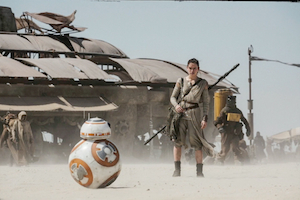 Then there's BB-8, the practical effect droid that's already become the
principal new character for many. Yes it's adorable and well executed,
adding a bit of scruffiness to a role usually played by Artoo. For those
paying attention the last three films really revolved around R2-D2, so
this new domed interloper does steal some of that thunder. Yet for me
one of the most poignant things about the whole film is the state that
Artoo is in when we finally meet him, and the contribution he makes. It
speaks to the larger narrative, and the cooperation between the two
droids is the most overt way that both old and new come together in this
film.
Then there's BB-8, the practical effect droid that's already become the
principal new character for many. Yes it's adorable and well executed,
adding a bit of scruffiness to a role usually played by Artoo. For those
paying attention the last three films really revolved around R2-D2, so
this new domed interloper does steal some of that thunder. Yet for me
one of the most poignant things about the whole film is the state that
Artoo is in when we finally meet him, and the contribution he makes. It
speaks to the larger narrative, and the cooperation between the two
droids is the most overt way that both old and new come together in this
film.
In very many ways this film has enormous heavy lifting to do - to sate filmgoers who felt burned by the prequels, to lay the groundwork for what's to come, and to reinvigorate a franchise. On all these metrics the film is a success. It does mean it plays it a bit safe, and its familiarity for those well versed in the way of the force will come across as pandering. There's a scene where we see the scale of the new big gun in contrast to what came before, and we even hear a kind of sarcastic remark from one of the assembled asking if this is just another Death Star. We're shown, in a holographic Powerpoint presentation, that this one's bigger. Different, see? But let's not talk about how this is the third one, shall we? That, presumably, would appear to be narratively lazy. Nor should we really look too closely about how the vulnerability of these things surely should be a primary design consideration going forward.
These are among the many nits to pick if one were so inclined, but what ties many of them together is the sense of build-up then deflation of some of the critical characters. Phasma for one has a terrific reveal then a mediocre reversal of her intimidating stature, all to serve a plotline that surely could have been resolved in more a effective way given that it echoes two other films.
Despite these many, many echoes there are still some key twists the film takes in terms of story and character. In a world of instant social media we're never going to have a "Luke, I'm your father" moment again, but the screenwriters manage I think generally to balance the sense of surprise with the more obvious connections that a film of this nature demands.
From a design point of view the film relies heavily upon the most recent trilogy, and where the prequels made retrograde strides towards deco we're now solidly here in geometric brutalism. The landing ships for the troopers are big grey boxes, its opening flap clunking down like the Higgins boats from D-day. From an effects standpoint it's a balance between spectacle and looking like a big video game. The costumes, makeup and creature effects are on first viewing in keeping with what came before, while the design and the execution of Lupita Nyong'o's digital character Maz Kanata is fine if in keeping with expectations raised back to the time of Gollum and JarJar.
One of the more clunky character effects may in fact be meant to look as such - a giant spectre of a character that shapes the motivation for the key antagonist. I'm going to dance around spoilers here as best I can and talk in generalities - what may well be most interesting about this character (played and apparently voiced by Andy Serkis) is that it may well tie even further to a major influence of Lucas', The Wizard of Oz. Again back to Ebert's '77 review he noted that "the golden robot, lion-faced space pilot, and insecure little computer on wheels must have been suggested by the Tin Man, the Cowardly Lion, and the Scarecrow". Now we may have an avatar like the Wizard, puppeteered by another menace hidden behind a virtual curtain. Who knows at this point, but we've got a few years to wonder.
Then there's some things that feel totally out of keeping, like the monsters aboard Han's freighter. Giant, wriggly things, they seem like they're part of another series of movies all together.
I look forward to seeing the film a few more times, to see how it plays on repeated viewings and how it sits comfortably with the other films in the saga. I'm going to make a guess - this film will be very well received by general audiences and will be a monstrous box office hit for months to come. I also think that as a film and as a storytelling device it'll actually age better in context with what's to come.
For what I've written above, about the need for this film to bridge, to be safe, to give audiences what they want while laying the (golden?) brickwork for its journey, it allows the next film in the series to really go for it. Rian Johnson is in a kind of enviable position, free to take the story and run with it in a way that this film simply never could. J.J. is a master of making films that feel like they were made by someone else, and equally proficient at setting things up. This film works as a TV pilot, emotional reboot and introduction to a new direction for the franchise, and on a strictly structural level that's a heavy task. For those that will notice (and not many will) you can sometimes see the seams of these machinations. It's why the next one, freed from the need from some of this work, may in fact feel even more ambitious and exciting. In turn, Episode VIII may make Episode VII even better, retroactively adding spice to some of the characters that haven't been drawn as well as could be, or give power to moments that now seem small but may have tremendous implications later.
The Force Awakens is certainly a worthy continuation of the saga, but at the same time Lucas' absence is felt. It lacks some of the zaniness, mystery, ambition and awkwardness of what came before, but gains a more constrained and focused execution that's surely more palatable to general audiences wanting a fun night out at the movies. I do admit to feeling a bit of loss of what's come before, a feeling that maybe the saga is heading in a direction that feels just that bit more contrived, just that little bit more manipulative in a way we've grown accustomed to from comic book films.
 I've only just awakened to the Force Awakens, only now coming to terms with the work as both a film and a part of a much larger connection
to the world of Star Wars. For writers of my age and temperament these works transcend regular aspects of filmgoing, becoming more events
or stages of life rather than merely works with a beginning, middle and end. These films, in so many ways, have become more phenomena than film, and at
times it's easy to lose under the hype what works and what doesn't about these episodes. I think the film works exactly as I expected it to, but there
wasn't much in the way of goosebump moments that really knocked me on my ass. Maybe I'm officially now too old to really be surprised, or maybe those first
moments that flashed on the trailer got that out of my system.
I've only just awakened to the Force Awakens, only now coming to terms with the work as both a film and a part of a much larger connection
to the world of Star Wars. For writers of my age and temperament these works transcend regular aspects of filmgoing, becoming more events
or stages of life rather than merely works with a beginning, middle and end. These films, in so many ways, have become more phenomena than film, and at
times it's easy to lose under the hype what works and what doesn't about these episodes. I think the film works exactly as I expected it to, but there
wasn't much in the way of goosebump moments that really knocked me on my ass. Maybe I'm officially now too old to really be surprised, or maybe those first
moments that flashed on the trailer got that out of my system.
I look forward to numerous more visits to the world that J.J. has helped create, confident that on repeated viewings I'll fall harder for some of the bits I like and soften on those that grate, just as has happened with every other film in the series. For now it's all so new, feeling slightly foreign to what's come before yet at the same time mildly pandering to what worked in the past. This will all settle in time, and surely most of you won't have the same level of ambivalence. I recommend heartily the following - go in with as open a mind as possible in order to be swayed by the wonder and fun of it all. It's not a film that stands up to overthink particularly well, nor is it meant to.
The Force Awakens is meant to honour the past and lead us into a new narrative future. It feels like what people feel a Star Wars film is supposed to feel like, and that's more than many could have hoped for. It's meant to be a blast and a bunch of summer-movie fun in the cold of December. It's mean to be a fresh start. It does all these things, sometimes quite brilliantly. The Force is strong with this one, despite its familiarity, and I look forward to future adventures that will lead from this new step into a different direction for this saga.
Star Wars: The Force Awakens
Director(s)
- J.J. Abrams
Writer(s)
- Lawrence Kasdan
- J.J. Abrams
- Michael Arndt
- George Lucas (based on characters created by)
Cast
- Harrison Ford
- Mark Hamill
- Carrie Fisher
- Adam Driver







